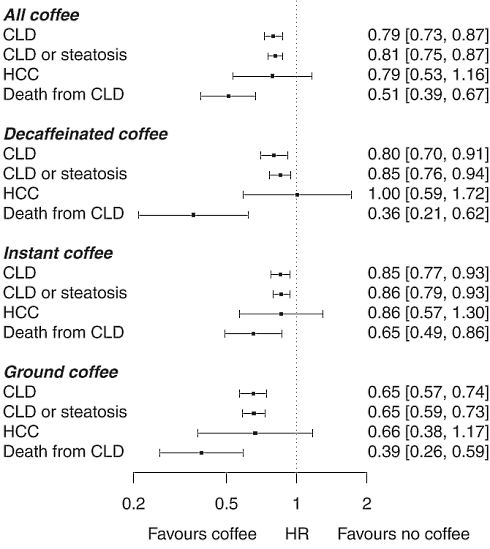Coffee protects against chronic liver disease
Drinking a few cups of coffee every day reduces the risk of chronic liver disease, British scientists discovered. Regular ground coffee works best.

Study
[TABLE="width: 358, align: right"]
[TR]
[TD="align: right"][/TD]
[/TR]
[/TABLE]
The researchers, who were affiliated with the University of Southampton, used data from 495585 Britons collected in the UK Biobank project. [ukbiobank.ac.uk] The researchers were able to follow the study participants for an average of 11 years.The researchers kept track of which study participants developed liver disease and which did not.
Results
About three-quarters of the study participants drank coffee - regular ground coffee, instant coffee, or decaffeinated coffee - while a quarter drank no coffee.
Approximately 3600 study participants developed chronic liver disease [CLD], 5400 study participants developed chronic liver disease or fatty liver [steatosis], 184 study participants developed hepatocellular carcinoma and 301 study participants died.
Drinking coffee reduced the risk of liver disease by roughly 20 percent, and the risk of death from liver disease by 49 percent.

The protective effect of coffee was optimal with an intake of 3-4 cups of coffee per day.
Mechanism
It is not clear what exactly the active substances in coffee are. Coffee also protects against cardiovascular disease, and caffeine may play a role in this. Caffeine blocks the A2aA receptor, thereby inhibiting the formation of scar tissue on diseased livers. However, caffeine does not play a role in protecting the liver, because decaffeinated coffee also has a positive effect.
Two other potentially interesting compounds in coffee are chlorogenic acid, kahweol and cafestol, all three of which can block the scarring of liver tissue. The latter two substances are present in ground coffee. And that is precisely the type of coffee with the greatest protective effect.

Conclusions
"This study provides evidence of a protective effect of all types of coffee (including decaffeinated) against chronic liver disease outcomes", the researchers write.
"These findings are significant given the paucity of effective preventative and treatment strategies for chronic liver disease, especially in low to medium income countries, where the burden of chronic liver disease is highest."
Source:
BMC Public Health. 2021 Jun 22;21(1):970.
Drinking a few cups of coffee every day reduces the risk of chronic liver disease, British scientists discovered. Regular ground coffee works best.

Study
[TABLE="width: 358, align: right"]
[TR]
[TD="align: right"][/TD]
[/TR]
[/TABLE]
The researchers, who were affiliated with the University of Southampton, used data from 495585 Britons collected in the UK Biobank project. [ukbiobank.ac.uk] The researchers were able to follow the study participants for an average of 11 years.The researchers kept track of which study participants developed liver disease and which did not.
Results
About three-quarters of the study participants drank coffee - regular ground coffee, instant coffee, or decaffeinated coffee - while a quarter drank no coffee.
Approximately 3600 study participants developed chronic liver disease [CLD], 5400 study participants developed chronic liver disease or fatty liver [steatosis], 184 study participants developed hepatocellular carcinoma and 301 study participants died.
Drinking coffee reduced the risk of liver disease by roughly 20 percent, and the risk of death from liver disease by 49 percent.

The protective effect of coffee was optimal with an intake of 3-4 cups of coffee per day.
Mechanism
It is not clear what exactly the active substances in coffee are. Coffee also protects against cardiovascular disease, and caffeine may play a role in this. Caffeine blocks the A2aA receptor, thereby inhibiting the formation of scar tissue on diseased livers. However, caffeine does not play a role in protecting the liver, because decaffeinated coffee also has a positive effect.
Two other potentially interesting compounds in coffee are chlorogenic acid, kahweol and cafestol, all three of which can block the scarring of liver tissue. The latter two substances are present in ground coffee. And that is precisely the type of coffee with the greatest protective effect.

Conclusions
"This study provides evidence of a protective effect of all types of coffee (including decaffeinated) against chronic liver disease outcomes", the researchers write.
"These findings are significant given the paucity of effective preventative and treatment strategies for chronic liver disease, especially in low to medium income countries, where the burden of chronic liver disease is highest."
Source:
BMC Public Health. 2021 Jun 22;21(1):970.

